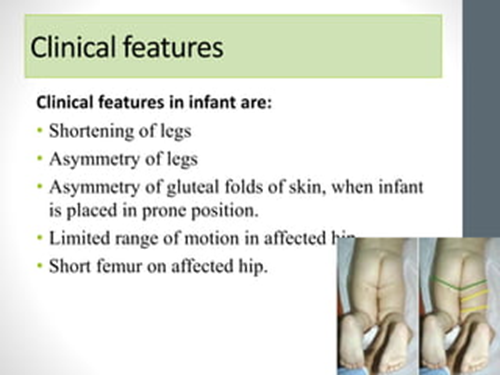A nurse is collecting data from an infant who has developmental dysplasia of the hip (DDH). Which of the following findings should the nurse expect?
Inwardly turned foot on the affected side
Lengthened thigh on the affected side
Absent plantar reflexes
Asymmetric thigh folds
Correct Answer : A,D
A. Inwardly turned foot on the affected side.
This finding is consistent with DDH. In infants with DDH, the affected leg may appear shortened and rotated inwardly due to hip instability or dislocation.
B. Lengthened thigh on the affected side.
This finding is not typically associated with DDH. In fact, the affected thigh may appear shortened rather than lengthened due to abnormal positioning of the hip joint.
C. Absent plantar reflexes.
Absent plantar reflexes are not directly related to DDH. Plantar reflexes assess the function of the spinal nerves in the lower extremities and are not typically affected by hip dysplasia.
D. Asymmetric thigh folds.
This finding is consistent with DDH. Asymmetric thigh folds, where one thigh appears fuller or has more skin folds compared to the other, can be indicative of hip dysplasia. The skin folds may be more prominent on the unaffected side due to the displacement of the femoral head on the affected side.

Nursing Test Bank
Naxlex Comprehensive Predictor Exams
Related Questions
Correct Answer is A
Explanation
A. Upright: This position allows for better expansion of the lungs and improved ventilation-perfusion matching, as gravity helps the diaphragm move downward and expand the lungs. It is often beneficial for patients with respiratory distress or failure.
B. Supine: While lying flat on the back (supine position) may be comfortable for some patients, it can restrict lung expansion, especially in individuals with compromised respiratory function. This position may not be ideal for maximal lung expansion in this scenario.
C. Prone: The prone position involves lying flat on the abdomen. In some cases, especially in adults with acute respiratory distress syndrome (ARDS), prone positioning has been shown to improve oxygenation by optimizing lung mechanics. However, it may not be practical or comfortable for all patients and is not typically used as a first-line intervention in school-age children with pneumonia.
D. Side-lying: While side-lying positions can sometimes improve lung expansion on the dependent side, it may not be as effective as the upright position in maximizing lung expansion, especially in cases of respiratory failure.
Correct Answer is ["B","D"]
Explanation
A. Cranberry juice
Cranberry juice may be too acidic and could irritate the surgical site. It's best to avoid acidic beverages immediately following a tonsillectomy.
B. Ice-cream
This option is suitable. Ice-cream is cold and soothing, and it can help numb the throat, providing relief from discomfort after a tonsillectomy. However, it's essential to ensure that the ice-cream is not too cold to avoid causing discomfort.
C. Hot tea
Hot tea is not recommended immediately following a tonsillectomy. Hot liquids can irritate the surgical site and may cause discomfort. It's best to avoid hot beverages until the throat has had time to heal.
D. Italian ice
Italian ice is a frozen dessert similar to a slushy, and it can be a suitable option after a tonsillectomy. Like ice-cream, Italian ice is cold and can help numb the throat, providing relief from discomfort.

Whether you are a student looking to ace your exams or a practicing nurse seeking to enhance your expertise , our nursing education contents will empower you with the confidence and competence to make a difference in the lives of patients and become a respected leader in the healthcare field.
Visit Naxlex, invest in your future and unlock endless possibilities with our unparalleled nursing education contents today
Report Wrong Answer on the Current Question
Do you disagree with the answer? If yes, what is your expected answer? Explain.
Kindly be descriptive with the issue you are facing.
